|
|
|
Sort Order |
|
|
|
Items / Page
|
|
|
|
|
|
|
| Srl | Item |
| 1 |
ID:
109147
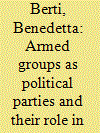

|
|
|
|
|
| Publication |
2011.
|
| Summary/Abstract |
In recent decades, armed groups have shown an increased interest in creating political parties to take part in institutional politics. By using these political wings to participate in elections and win public office, some of them have gained enormous political power. However, despite the important real-world implications of this trend, the existing literature on the topic is still underdeveloped. This article contributes to a better understanding of this subject by examining the factors that motivate armed groups to set up a political wing and compete in elections and by assessing how political participation affects an armed group's strategic outlook. The hypotheses on political wing formation and development are tested by analyzing the decision-making patterns of Hizballah. The findings suggest that the political involvement of armed groups does not follow a linear development process from armed to political organization, but instead assumes cyclical patterns: political accommodation and armed struggle are chosen in turn in response to shifts in the relation and the internal balance of power between a given group's political and armed wings.
|
|
|
|
|
|
|
|
|
|
|
|
|
|
|
|
| 2 |
ID:
132889
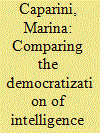

|
|
|
|
|
| Publication |
2014.
|
| Summary/Abstract |
This article discusses the reform of intelligence governance in two sub-regional groupings of former communist states: East Central Europe and the Balkans. These two sub-regions are delineated according to the pace and nature of transformations that they have undergone since the collapse of communist rule and their relations with respect to the European Union, the key political and economic organization in Europe. A number of lessons are drawn from comparing experiences in the two sub-regions relating to democratic reform of the security apparatus, and in particular the intelligence sector. Significant factors in the consolidation of democratic governance of intelligence include the nature of precursor communist-era regimes and the legacies they created, whether armed conflict has occurred during the transition, the extent and character of external (especially EU) assistance, and the strength of media and civil society. These factors appear to have influenced how transitional regimes have sought to introduce institutional reforms to constrain the powers of those services and their susceptibility to arbitrary use. They also have influenced measures taken to redress abuses by intelligence services under the preceding communist regime and the legitimation of the post-authoritarian state.
|
|
|
|
|
|
|
|
|
|
|
|
|
|
|
|
| 3 |
ID:
102045
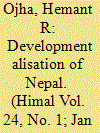

|
|
|
| 4 |
ID:
130614


|
|
|
|
|
| Publication |
2014.
|
| Summary/Abstract |
Throughout much of history the Institute a/'/international Relations /[IR] has been perceived as a Kuomintang think tank. Based an the perspective generated by personal contributions (before its formal establishment in 1975as part of National Chengchi University, the author tracer the IIR's foundations and key staff as far back as 1937 to argue that is was constructed during a national crisis because the state leader needed professional opinions that could be used strategically. Thus rather than considering the IIR as an organization subject to a political party. it should be regarded as on institution charged with gathering scholars to defend the country.
|
|
|
|
|
|
|
|
|
|
|
|
|
|
|
|
| 5 |
ID:
129653
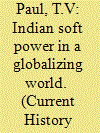

|
|
|
|
|
| Publication |
2014.
|
| Summary/Abstract |
Soft power-based on intangible indicators such as culture, civilization, literature, philosophy, involvement in global institutions, diplomacy, political organization, and state capacity-has emerged as an important factor in the globalizing world for nations seeking higher status and influence. But an appraisal of India's present and putative soft power assets underscores the need for greater hard power resources in order to harness soft power more effectively. Indeed, soft power without hard power is a chimera, and they should not be seen in oppositional terms, especially for an aspiring global power. Hard power sources include military, economic, demographic, and technological assets. As defined by Harvard's Joseph S. Nye Jr. in his 2004 book Soft Power: The Means to Success in World Politics, soft power "is the ability to get what you want through attraction rather than coercion or payments. It arises from the attractiveness of a country's culture, political ideals, and policies. When our policies are seen as legitimate in the eyes of others, our soft power is enhanced." Yet a country relying solely on soft power without hard power assets can find its weaknesses exposed easily. This happened to India in 1962, when China inflicted a humiliating military defeat on it, tarnishing New Delhi's hard-won soft power position in the world, especially among other de.
|
|
|
|
|
|
|
|
|
|
|
|
|
|
|
|
| 6 |
ID:
128991
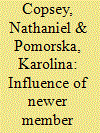

|
|
|
|
|
| Publication |
2014.
|
| Summary/Abstract |
This article seeks to examine and assess the role of Poland in the early stages of the making of the Eastern Partnership of the European Union. First, it briefly reviews Poland's aims and ambitions with regard to the European Union's policy towards its eastern neighbours, both before and since it joined the European Union in 2004. Second, it describes and analyses the Eastern Partnership, including its added value for the European Neighbourhood Policy. Third, it draws on a range of interviews carried out by the authors in Brussels and Warsaw on Poland's role in the initial formation of the Eastern Partnership, as seen by its partners in the other member states and European institutions. In addition, it seeks to unpack some of the early stage lessons learnt by the Polish government about how best to achieve its ambitions in the European Union, and notes the remaining weaknesses of the Polish administration, particularly in the area of administrative capacity.
|
|
|
|
|
|
|
|
|
|
|
|
|
|
|
|
| 7 |
ID:
153593


|
|
|
|
|
| Summary/Abstract |
This article examines the combined use of maps and symbols as an official symbol of political organization. Used in combination, a map and an emblem push the geographical component to the forefront of cultural–political discourse as an element of myth, drawing attention to an aspect that is not a conscious part of daily life. The article explores how the map of the Land of Israel was used as an official symbol by Zionist organizations, and attempts to decipher the political–cultural significance of the symbolic geography they employed. A symbolic map of Eretz Yisrael was adopted by three Zionist organizations: the Jewish National Fund (JNF); HaMahanot HaOlim Socialist–Zionist youth movement and the Revisionist movement. Aside from their differences in mission and raisons d’être, the organizations in this study represent different models of map and symbol usage. The main distinguishing feature was in their use of outlines and borders.
|
|
|
|
|
|
|
|
|
|
|
|
|
|
|
|
| 8 |
ID:
124150
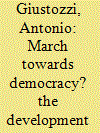

|
|
|
|
|
| Publication |
2013.
|
| Summary/Abstract |
Although the post-2001 period in Afghanistan has been hailed as a return to an earlier process of democratic opening that was interrupted in the early 1970s, a comparison of the development of political movements up to 1978 and then after 2001 highlights important differences. Until the late 1960s, Afghan political parties were mainly focused on influencing a supposedly enlightened leadership towards faster modernization of the country. Their disillusion was beginning to push them towards the development of forms of organization which could mobilize sections of the population on their behalf, even if tentatively so. Little comparable effort was noticeable after 2001, when parties big and small, seemed intent mainly on securing a position from which to develop a following based on the distribution of patronage. It could be argued that the availability of resources on a large scale following international intervention in 2001 drove the Afghan political system in a direction quite different from the path which was initially embarked upon in the 1960s.
|
|
|
|
|
|
|
|
|
|
|
|
|
|
|
|
| 9 |
ID:
119704
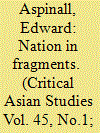

|
|
|
|
|
| Publication |
2013.
|
| Summary/Abstract |
Scholars of Indonesia are still searching for ways to characterize the ordering principles of the new post-Suharto politics. In the 1950s and 1960s, Clifford Geertz's notion of aliran (stream) politics captured central features of Indonesian political life. In the 1970s and 1980s, the state took center stage, with scholars seeing the New Order state as standing above society, depoliticizing and reordering it. Since reform began in 1998, these analyses are clearly no longer adequate, but scholars have yet to find persuasive alternatives. This article offers one attempt to diagnose the fundamentals of political organization in contemporary Indonesia. It starts by emphasizing the organizational fragmentation that characterizes much contemporary political life. It seeks the origins of this fragmentation in two sources: the ubiquity of patronage distribution as a means of cementing political affiliations and the broader neoliberal model of economic, social, and cultural life in which patronage distribution is increasingly embedded. These two forces are often portrayed as being incompatible, but in practice they are frequently intertwined. This argument is first substantiated by reference to the project (Indonesian: proyek), a mechanism for distributing economic resources that is pervasive in Indonesia. The proyek formally adheres to the expectations of transparency and competition associated with neoliberalism, but is also a major source of patronage. Proyek-hunting drives much of the fragmentation in contemporary Indonesian political and social organization. The argument is then illustrated with examples drawn from four spheres: state structures, political parties, non-governmental organizations and Islamic politics.
|
|
|
|
|
|
|
|
|
|
|
|
|
|
|
|
| 10 |
ID:
075280
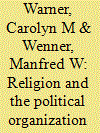

|
|
|
|
|
| Publication |
2006.
|
| Summary/Abstract |
Some analysts have raised serious concerns about the foreign and domestic policy implications of the large numbers of Muslims living in Western Europe. The fear is that Muslims as a bloc will co-opt the domestic and foreign policy of various European states, subsuming it to those of Muslims from a variety of Islamic states in the Middle East and Asia, and transform the secular nature of most European states. The historic and ingrained fear of Islam present in the populations of Europe (and, for that matter, the United States) has produced an inability to see the political nature of Islamic groups, especially outside the Islamic world. For example, both Europeans and Americans were quick to question the political motives and actions of Muslims in Europe and the U.S. when there was no organized and orchestrated condemnation of the attacks of September 11, 2001. What such critics fail to take into account is precisely one of the themes analyzed in the paper: the myriad divisions found among the Muslims of Europe. Western fears and criticisms are partly based on serious ignorance of the characteristics of Islam and of the people in Europe who adhere to it. Because Islam is a highly decentralized religion, it is structurally biased against facilitating large-scale collective action by its adherents. The one version which is hierarchically organized, the Shi'a, is barely present in Europe. In addition, Muslim immigrants are divided by their ethnic differences. Islam, being decentralized, allows for a myriad of practices in the different countries from which the immigrants came. Divided by ethnicity and by their own religious beliefs, Muslims in Europe will not constitute a group which will be able to impose its goals on European foreign and domestic policy. Muslims will, instead, be a diverse population with which European states find it difficult to negotiate, because of Islam's decentralized structure. a Footnotes a Carolyn M. Warner is Associate Professor of Political Science and Global Studies, Arizona State University (carolyn.warner@asu.edu). Manfred W. Wenner is Visiting Scholar, Department of Political Science, Arizona State University (mwwenner@northlink.com). The authors wish to thank Guity Nashat Becker, Jocelyne Cesari, Colin Elman, Miriam Fendius Elman, Roger Finke, Paul Froese, Anthony Gill, Phillip Hardy, Michael Hechter, Jennifer Hochschild, Kevin Jacques, Ramazan Kilinc, Timur Kuran, Peter McDonough, Michael Mitchell, Christopher Soper, Hendrik Spruyt, Robert Youngblood, three anonymous reviewers, the participants at the University of Washington Center for European Studies/European Union Center "September 11, Immigration and Nationalism in Europe" seminar, and the participants at the University of Wisconsin Madison "East and West: the Experience of Islam in an Expanding Europe" conference for their critical comments and suggestions. Errors and shortcomings remain our responsibility. The authors thank Beatrice Buchegger, Anita Clason, Katie Jordan, Megan McGinnity, and Seth Turken for research assistance, and the Arizona State University Center for the Study of Religion and Conflict for financial support.
|
|
|
|
|
|
|
|
|
|
|
|
|
|
|
|
| 11 |
ID:
130449
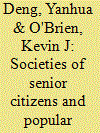

|
|
|
|
|
| Publication |
2014.
|
| Summary/Abstract |
Societies of Senior Citizens (SSCs) are often thought to be non-political organizations focused on community traditions and services for the elderly. In Huashui Town, Zhejiang, however, SSCs took the lead in mobilizing protest and caused 11 factories to be closed. From 2004 to 2005, SSCs helped to fund a lawsuit, engineered a petition drive and organized tent-sitting at a chemical park notorious for its pollution. Huashui's SSCs were effective mobilizing structures owing to their strong finances, organizational autonomy, effective leadership and the presence of biographically available, unafraid older villagers. Skillful mobilization led to efforts to rein in village SSCs and a reorganization which, however, had only a limited effect. SSC experiences in Huashui suggest that organized protest in China is more feasible than often thought and that understandings of protest outcomes should go beyond the success or failure of an episode to explore long-term consequences for the organizations involved.
|
|
|
|
|
|
|
|
|
|
|
|
|
|
|
|
| 12 |
ID:
129250
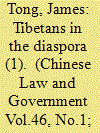

|
|
|
|
|
| Publication |
2013.
|
| Summary/Abstract |
An introduction to the journal is presented which discusses chapters from the book "Research on the Dalai Group and Tibetans Overseas" dealing with demographic composition, social and educational institutions.
Since the Tibetan Rebellion in March 1959, the Dalai Lama and his supporters have established the Tibetan Central Administration as the government-in-exile. Located in the Himalayan foothills and surrounded by dense coniferous forests in the Indian state of Himachal Pradesh, Dharamsala has been the seat of the exiled government and the residenceof the 14th Dalai Lama since May 1960. The 50,000 original Tibetan émigrés have grown to around 120,000, the largest number residing inI ndia as well as in the Himalayan states of Nepal and Bhutan in addition to smaller communities in thirty-eight other countries. This and the following issue are focused on these Tibetans in the Diaspora, including their political organization, economic conditions, military apparatus, demographic composition, and social and educational institutions.
|
|
|
|
|
|
|
|
|
|
|
|
|
|
|
|
| 13 |
ID:
133025
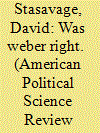

|
|
|
|
|
| Publication |
2014.
|
| Summary/Abstract |
Do strong property rights institutions always help, or might they sometimes actually hinder development? Since Max Weber and before, scholars have claimed that the presence of politically autonomous cities, controlled by merchant oligarchies guaranteeing property rights, helped lead to Europe's rise. Yet others suggest that autonomous cities were a hindrance to growth because rule by merchant guilds resulted in restrictions that stifled innovation and trade. I present new evidence and a new interpretation that reconcile the two views of city autonomy. I show that politically autonomous cities initially had higher population growth rates than nonautonomous cities, but over time this situation reversed itself. My evidence also suggests why autonomous cities eventually disappeared as a form of political organization. Instead of military weakness, it may have been their political institutions that condemned them to become obsolete.
|
|
|
|
|
|
|
|
|
|
|
|
|
|
|
|
| 14 |
ID:
126727
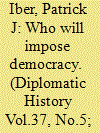

|
|
|
|
|
| Publication |
2013.
|
| Summary/Abstract |
This article examines the life of Sacha Volman (1923-2001), a Romanian exile who became a key conduit for CIA support to Latin America's anticommunist left during the Cold War. It traces the evolution of the front groups that underwrote his activities, his involvement with institutes for political training and the production of propaganda in Mexico and Costa Rica, and, most importantly, his organizing in support of the short-lived presidency of Juan Bosch (1963) in the Dominican Republic. The article argues that, contrary to traditional accounts, the Cold War environment and the actions of the United States provided certain opportunities for the political left in the region-provided, of course, that it was an anticommunist left. Yet CIA support was a weak form of commitment on the part of the United States. In the end, Volman's ally Bosch was overthrown and President Johnson sent troops to prevent him from being restored to power, while much of the propaganda produced by his movement was easily appropriated by the very powers that had deposed it. Acceptance of the hegemonic position of the United States and its anticommunist agenda-the same thing that gave social democratic parties their lease on life in the international arena-left them with little political flexibility.
|
|
|
|
|
|
|
|
|
|
|
|
|
|
|
|
| 15 |
ID:
097815
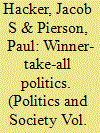

|
|
|
|
|
| Publication |
2010.
|
| Summary/Abstract |
The dramatic rise in inequality in the United States over the past generation has occasioned considerable attention from economists, but strikingly little from students of American politics. This has started to change: in recent years, a small but growing body of political science research on rising inequality has challenged standard economic accounts that emphasize apolitical processes of economic change. For all the sophistication of this new scholarship, however, it too fails to provide a compelling account of the political sources and effects of rising inequality. In particular, these studies share with dominant economic accounts three weaknesses: (1) they downplay the distinctive feature of American inequality -namely, the extreme concentration of income gains at the top of the economic ladder; (2) they miss the profound role of government policy in creating this "winner-take-all" pattern; and (3) they give little attention or weight to the dramatic long-term transformation of the organizational landscape of American politics that lies behind these changes in policy. These weaknesses are interrelated, stemming ultimately from a conception of politics that emphasizes the sway (or lack thereof) of the "median voter" in electoral politics, rather than the influence of organized interests in the process of policy making. A perspective centered on organizational and policy change -one that identifies the major policy shifts that have bolstered the economic standing of those at the top and then links those shifts to concrete organizational efforts by resourceful private interests -fares much better at explaining why the American political economy has become distinctively winner-take-all.
|
|
|
|
|
|
|
|
|
|
|
|
|
|
|
|
| 16 |
ID:
097828
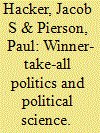

|
|
|
|
|
|
|
|